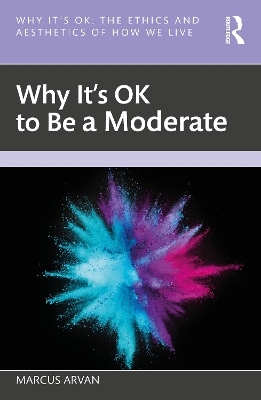
Why It's OK to Be a Moderate
Routledge (Verlag)
978-1-032-61386-4 (ISBN)
- Noch nicht erschienen (ca. März 2025)
- Versandkostenfrei innerhalb Deutschlands
- Auch auf Rechnung
- Verfügbarkeit in der Filiale vor Ort prüfen
- Artikel merken
In Why It’s OK to be a Moderate, Marcus Arvan shows how many of history’s worst evils have resulted from far-right and far-left radicalism, how escalating conflicts between conservatives and progressives are undermining democracy, and how many widely hailed social and political achievements have been achieved by moderates and radicals working in constructive tension with each other.
Using philosophy, science, and historical analysis, Arvan shows that critics of moderates tend to equate them with spineless centrists, but that most moderates aren’t centrists, falling into diverse categories across the political spectrum. Arvan then shows that although radicals tend to be popular in their era, many of them have gone down in infamy, while many moderates, like Abraham Lincoln or Clement Attlee, have endured short-term unpopularity to “make history.”
Arvan shows that it’s OK to be a moderate precisely because not everyone should be one. He makes this case to you, showing that whatever your reasonable political ideology may be, things tend to go best politically when radicals and moderates effectively complement each other’s virtues while counterbalancing the other’s vices.
Key Features
Uses science and historical analysis to show that while liberals and conservatives may have some political virtues, radicals on both sides of the political spectrum tend to display twelve political vices that undermine democracy
Explores how Aristotle’s idea of the “Golden Mean” and Buddhism’s “Middle Way” might be used to better understand far-left and far-right mistakes in the UK, US, Continental Europe, and India
Shows how moderates are a leading political demographic, existing in greater numbers than liberals or conservatives while falling into diverse categories across the political spectrum
Documents how radicalism has underwritten many of history’s worst political events, along with many of the most widely acknowledged political problems of the 20th and 21st centuries
Demonstrates to the reader that things tend to go best politically when radicals and moderates work in constructive tension with each other, and worst when there aren’t enough moderates
Marcus Arvan is Associate Professor of Philosophy at the University of Tampa. He has published widely in moral and political philosophy, and metaphysics and philosophy of mind. His two previous books are Rightness as Fairness: A Moral and Political Theory (2016) and Neurofunctional Prudence and Morality: A Philosophical Theory (2020).
1. The Curiously Poor Reputation of Moderates 2. What is it to be a Moderate? Means, Ends, Degrees, Contexts 3.The (Potential) Virtues of Progressivism and Conservatism, But (Very Real) Vices of Radicalism 4. The (Very Real) Virtues and (Potential) Vices of Moderates 5. Radical 20th Century Solutions, Radical 21st Century Problems: From Isolationism, Communism, Fascism, Reaganomics, and Thatcherism to Brexit, White Nationalism, and Back Again 6. Why It’s OK to be a Moderate: Prudently Guiding the Political Pendulum (with Radicals!)
| Erscheint lt. Verlag | 17.3.2025 |
|---|---|
| Reihe/Serie | Why It's OK |
| Verlagsort | London |
| Sprache | englisch |
| Maße | 129 x 198 mm |
| Themenwelt | Geisteswissenschaften ► Philosophie ► Erkenntnistheorie / Wissenschaftstheorie |
| Sozialwissenschaften ► Soziologie | |
| ISBN-10 | 1-032-61386-6 / 1032613866 |
| ISBN-13 | 978-1-032-61386-4 / 9781032613864 |
| Zustand | Neuware |
| Haben Sie eine Frage zum Produkt? |
aus dem Bereich


![Was heißt Denken?. Vorlesung Wintersemester 1951/52. [Was bedeutet das alles?] - Martin Heidegger](/media/113619842)